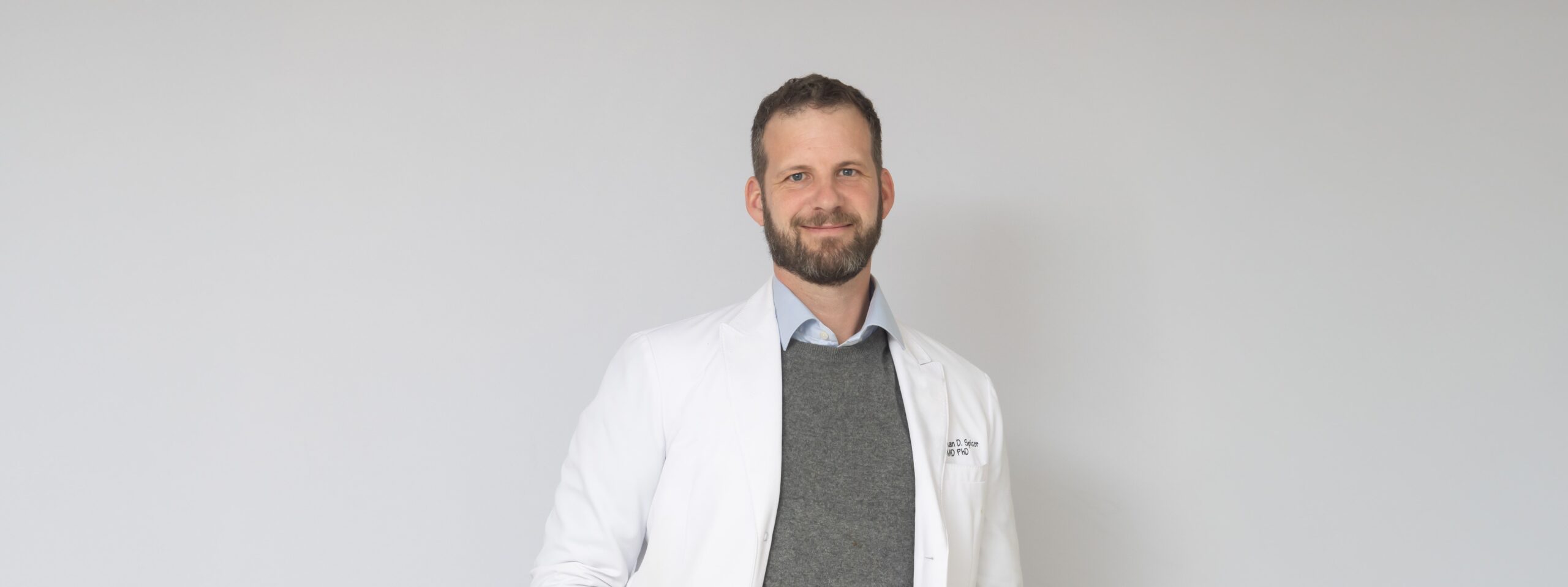Equal access to the best care and support
Where you live shouldn’t determine your chances of surviving cancer. Survival rates for cancer are lower for those living outside of Montreal. Together we can give better access to the best care and support for patients from the Gaspé to Gatineau, from southern Quebec to Nunavik.
Priority Initiatives
Overcoming postal code discrimination for thoracic cancer patients $3.5M
While 42 hospitals from Gaspé to Gatineau refer patients with complex thoracic cancers to the MUHC, survival rates are lower for those living outside of Montréal. Why? They don’t have local access to the latest treatments and higher quality of care available in clinical trials run in Montréal.
Trials require weekly scans and checkups to monitor disease progression. For most, it’s too far to travel and too expensive. Local community hospitals aren’t staffed to offer clinical trials to their patients.

Dr. Jonathan Spicer

Armen, a Security Guard at the Montreal General Hospital was a stage 3 lung cancer patient who enrolled in a successful clinical trial led by Dr. Spicer. He is now in remission.
“We see a huge opportunity to enable our network of referring hospitals to participate in these innovative trials to overcome these postal code disparities, improving outcomes and advancing scientific discovery.”
Dr. Jonathan Spicer
Thoracic Surgeon, MUHC
Medical Director, McGill Thoracic Oncology Network
From diagnosis to recovery, optimizing surgical pathways in every Québec hospital ($1.5M)
“With your support, we are helping every Québec hospital centre implement the latest and best surgical protocols – first developed here – to improve outcomes for cancer patients across the province.”
Dr. Liane Feldman, Surgeon-in-Chief, MUHC
Chair of the Department of Surgery, McGill University

Dr. Liane Feldman

Enhanced recovery pathways completely optimize the patient journey including before (pre-habilitation to prepare for surgery), during hospitalization, and after surgery (rehabilitation for a full recovery). Developed first at the MGH-MUHC in a transformative interdisciplinary program called Enhanced Recovery After Surgery (ERAS), these pathways are now being implemented in more than 80 hospitals across the province for colorectal and gynecological cancer surgery, with other cancer surgeries to follow. Enhanced recovery pathways improve patient outcomes and patient satisfaction while reducing costs for the healthcare system.

WHOLE-PERSON-CARE, ADAPTED TO SPECIFIC PATIENT POPULATIONS
A new space and a new approach to revolutionize the experience of cancer care ($15M)
Cancer care historically responds reactively to the supportive and palliative care needs of people affected by cancer, intervening later than is optimal for providing the most effective assistance. Building on the legacy of Whole Person Care at McGill, we are re-engineering the system to proactively meet the needs of people affected by cancer and ensure they have access to best-in-class services that improve both their quality of life and their chances of benefiting from cancer therapies.
“We now have a unique opportunity to bring these services together in one, easily-accessible location, to offer seamless care and improve quality of life and patient outcomes.”
Dr. Justin Sanders
Director, Division of Supportive and Palliative Care, MUHC

Dr. Justin Sanders

Virginia Lee, R.N., PhD
The Jackie Aziz AYA Program at Cedars: A new cancer program for adolescent and young adult patients ($2M)
“Younger people with cancer face very different challenges and fears: finishing education, establishing careers, fertility loss and starting a family. Our new program bridges the pediatric and adult missions to offer holistic care – and access to the latest research and clinical trials – to meet their unique needs.”
Virginia Lee, R.N., PhD
Manager, Supportive and Palliative Care Program and Services, MUHC
Co-Director, Cedars CanSupport
Cancer’s lost generation: the teens and young adult’s forgotten in the middle.
While overall cancer survival rates have improved, young people fare less well – and their symptoms are often dismissed.

Ryan, a courageous young cancer survivor

Geri-CARE: Supporting older patients ($2M)
Cancer treatments can be extremely hard on the body, and especially for seniors. Geri-CARE offers individualized exercise, nutrition and supportive therapy programs. These are designed to help senior patients improve their cognitive and physical function, maintain independence and mobility, all while decreasing social isolation.
Equal access to the
best care and support
“Most care services are aimed at standard adult populations. Young adult and geriatric patients need access to care and research that takes into account their specific life-circumstances.”
Dr. Armen Aprikian
Chief, MUHC Cancer Care Mission

Dr. Armen Aprikian
Enabling access to sarcoma trials in Quebec ($3.5M)
“With patients dispersed across the province, no single hospital could enroll enough patients to make a clinical trial viable. Patients had to travel far out-of-province or to the US. With your support, patients can now access trials here in Montréal, enabling us to advance research and grant patients potential avenues to prolonged, healthier lives.”
Dr. Ramy Saleh
Medical Director, Oncology Clinical Trials, RI-MUHC
Staff Medical Oncologist, MUHC

Dr. Ramy Saleh

Dr. Robert Turcotte, an orthopedic surgeon, is part of the Orthopedic Oncology team at the MUHC and part of the McGill Sarcoma team.
Sarcomas are a rare, complex, and deadly group of cancers that arise in bones and connective tissues. 300 patients receive a diagnosis each year in Québec. Dr. Ramy Saleh co-founded and leads the Sarcoma Research Consortium of Quebec (SARC-Q), a consortium that currently consists of sarcoma experts from 12 hospitals, which aims to standardize sarcoma care across the province and consolidate all clinical trials at the MUHC.

